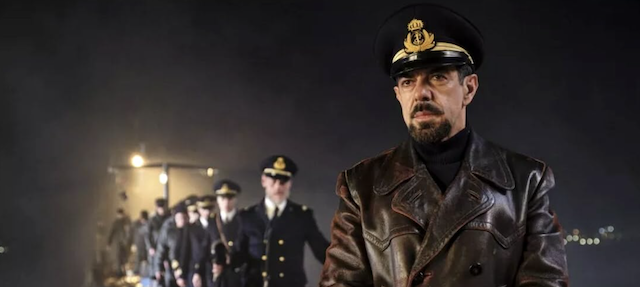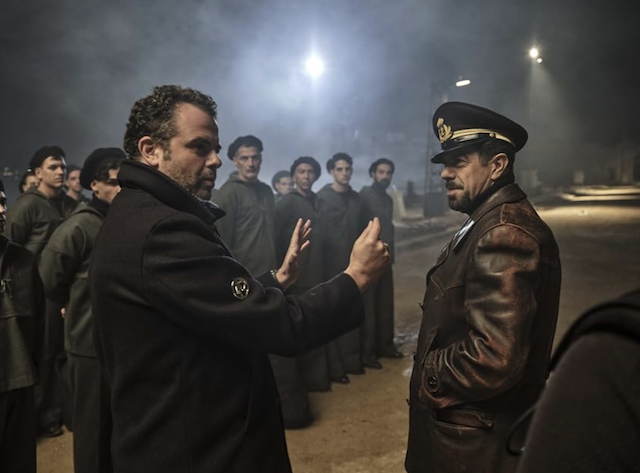
©Courtesy of Cinecittà Studios
Edoardo De Angelis (The Vice of Hope, Open Roads 2019; Indivisible, Open Roads 2017) returns to Film at Lincoln Center with his latest, a gripping maritime thriller driven by a powerhouse performance from Pierfrancesco Favino. Favino stars as Salvatore Todaro, the Italian Royal Navy officer in charge of the submarine Cappellini in the early years of World War II.
After overcoming a shocking ambush on the Atlantic Ocean, Todaro and his men are confronted with a moral quandary: Should they rescue the men who just attacked them, or, as the Fascist authorities have ordered, leave those men to die? The War Machine(Comandante) is a war film in the best sense, eschewing sensationalism and sentimentality in order to closely examine the courage of upholding one’s ethics in times of social rupture.
Exclusive Interview with Director Edoardo De Angelis
Q : The best quality of The War Machine is the narrative tension, generated from the conflict among human beings more than the fighting scenes. How did you work on this side of the movie?
Edoardo De Angelis – When we use the word war, sometimes it can stay just a word. It can remain that way until we watch images of distant wars, even the most horrible and gory. The ones which are censored, that we need to hide from children’s looks. Even those can be something far until we don’t empathize with that human being in the middle of a war.
Until we imagine ourselves inside a conflict: this is what I tried to do with my movie, put my characters and myself in that stage, experience with them the cold nights in the Atlantic Ocean, the smell of gunpowder or burnt skin, the fear of death at any moment. The ephemeral feeling of protection that an iron fish deep in the ocean can give.
The sacrifice of sharing tight spaces and the small amount of oxygen which gives us the hope of surviving. The warmth of a hug that we give, happy to share a simple potato. All of this created for me the emotional link that held together the story and the mise en scene. If The War Machine wouldn’t have at its core the human being, it would have become just a superficial experience.
Q : Even if set in a very tight and specific microcosm, The War Machine talks about universal issues. How did you work in order to balance these two sides of the story?
Edoardo De Angelis – The story of a man is the story of all men. There is something that links all of us, we can’t exactly say what it is, and we don’t speak about it in some scientific book, we speak about it through movies. When we tell stories with friends at dinner or in front of a campfire in the woods, if they tell the story of a man or a woman, it’s the story of every one of us. It’s within us, something universal. Storytelling is the most universal thing I can imagine.
Q : Which has been for you the most emotional scene to shoot in this movie?
Edoardo De Angelis – The scene that moved me the most is the one in which Italians and Belgians, in front of a sensational discovery for that time as the fried potato, sat together and made peace, singing a song about the previous war. Since I loved to shoot the movie following the chronological sequence, I shot this scene basically at the end. It reminded me that even in the most cruel times like a war, even if under a dictatorship like the Fascism that Salvatore Todaro and his crew experienced, it is possible to remember what it means to be a human being, to remember how important is to follow our nature, which sets for us some boundaries even in the act of violence.
A war could seem the most reckless and lawless of the scenarios, but we need to remember that after World War II the Nuremberg trials declared that some crimes against humanity shouldn’t happen anymore. This is history, not fantasy. So that hug made me laugh and at the same time moved me, which is what drives me into a movie like a magnet. Because this is life, the simultaneous presence of opposite feelings, this fragile balance when you don’t know if to cry or to laugh. In the end, you probably cry and laugh at the same time, acknowledging that since you’re still alive, you can also head somewhere good.

©Courtesy of Cinecittà Studios
Yours is a World War II movie which in some way talks about the present, especially what happens today in the sea about immigrants. What would you like the audience to learn watching it?
Edoardo De Angelis – I raised some questions with The War Machine that I felt like urgent. I asked myself: even if in wartime, under the dictatorship, a man like Salvatore Todaro didn’t forget to be and act like a human being, which is something far from being heroic, it’s simply sticking to what we are, maybe the time has come to erase the polarization of ideological conflict, maybe it’s the time to set the basis for true progressive thinking.
An idea which has at the center the human being, with all his layers. I was aware that The War Machine would have raised issues from both sides of our Country because the same people who today are inspired by these ideologies, today they don’t behave as Todaro behaved. Those who instead belong to the opposite ideology, sometimes can’t go over the surface of appearance.
I knew it was going to happen, so it was even important for it to happen because cinema is a political act, it shares a vision of the world, and in my Country, the progressive side, and the liberal side too, have been suffocated by ideological polarization. We forgot in a collective amnesia that between the two opposite poles a layered truth exists, but it’s at the same time very clear when we come back to listen to our humanity.
The law of the sea is for everyone, and everyone can embrace it or pretend to forget it, deliberately ignore it. But that law is still there. You can’t change it, otherwise you commit an act that isn’t human. We should always remember that, quoting Edoardo De Filippo, there is always the chance that one day every one of us could be forced to knock at someone else’s door. If we remember who we really are, I think most of the human conflicts would be solved.
If you like the article, share your thoughts below!
Check out more of Adriano’s articles.

